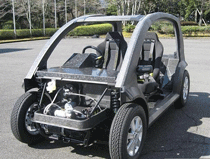New process molds CFRP parts in sub-1 minute cycles
Thermoplastics replaces thermoset plastics in a carbon fiber parts process that facilitates the molding of large, complex applications such as automobile cabin frames in cycle times of less than one minute. The announcement comes as multiple carmakers are actively forging ties with carbon fiber suppliers to support increased use of these fibers in their vehicles
March 9, 2011
Thermoplastics replaces thermoset plastics in a carbon fiber parts process that facilitates the molding of large, complex applications such as automobile cabin frames in cycle times of less than one minute. The announcement comes as multiple carmakers are actively forging ties with carbon fiber suppliers to support increased use of these fibers in their vehicles
|
Teijin developed this CFRP concept car to help carmakers and others get a look at what is possible with its new technology. |
The announcement from Teijin (Tokyo, Japan) comes just weeks after another carbon fiber supplier out of Tokyo, Toray, announced it had signed a joint development agreement (JDA) with carmaker Daimler to supply that OEM with carbon fiber and to help it develop a process for rapid manufacturing of carbon fiber reinforced plastic (CFRP) parts. Toray and Daimler's pact followed a similar supply and process development agreement forged last year between BMW and carbon fiber supplier SGL Carbon. Toray and Daimler say that their JDA has succeeded in developing a technology for mass-production of CFRP parts with what the companies describe as "a significantly shorter molding cycle." The partners plan to start supplying the mass-produced CFRP parts utilizing this "Short Cycle Resin Transfer Molding" for Daimler's Mercedes-Benz passenger vehicles to be launched in 2012. And in mid-February 2011, carmaker Audi, which belongs to VW, announced that Tier One automotive systems supplier Voith will supply Audi with the goal of the partnership to promote industrialization of fiber-reinforced materials, developing a highly automated process chain for high-volume automotive production.
Although Toray and Daimler wouldn't answer a PlasticsToday question as to what those shorter cycle times might be, Teijin is quite eager to let it be known that its compression molding process will get good parts made in a minute or less. Teijin and Toray are both based in Tokyo but Teijin officials told PlasticsToday that they did not work with their competitor on this development. Teijin's new technologies rely on thermoplastics as a matrix material instead of conventional thermosetting resins for CFRP parts. Compression molding of thermoset plastics with carbon fiber reinforcement is not new, but typically involves cycle times of 2-3 minutes or even longer, depending on part size and shape. Teijin says it also has developed technologies for welding thermoplastic CFRP parts together and for bonding CFRP with materials such as steel.
Teijin intends to develop mass production applications for CFRP in automobiles and other items that require certain levels of structural strength, such as machine tools and industrial robots. Teijin supplies aramid fibers, carbon fibers, polyester fibers, plastics, plastic films, and other products. Toho Tenax is the business with Teijin Group responsible for carbon fiber supply.
Teijin developed three thermoplastics for this rapid CFRP parts' processing technology. The materials can be used selectively depending on the required strength and cost of the part, reports Teijin, and they can be made with various thermoplastic resins, including polypropylene and polyamide. In answer to a PlasticsToday question, Teijin officials said the thermoplastics used are standard grades.
From Teijin, processors and material specifiers have three choices. One is a unidirectional intermediate compound that is said to offer ultrahigh strength in a specific direction. The second, an isotropic intermediate, offers a balance of shape flexibility and multidirectional strength. The third are long-fiber thermoplastic pellets reinforced with carbon fiber, suitable for injection molding of complex parts. Teijinofficials would not go into detailon the means used to create these compounds "due to competitive reasons."
Using these compounds, Teijin developed its new technologies for the compression molding of CFRP with cycle times as low as one minute. To demonstrate its new technologies, Teijin has developed an electric vehicle (EV) concept car (see photo) that features a cabin frame made entirely from thermoplastic CFRP and weighing only 47 kg, or roughly one-fifth the weight of a conventional automobile's cabin frame. The four-seat EV is capable of speeds up to 60 km/hr (about 35 mph) and has a cruising range of 100 km (62 miles). Teijin will use the concept car to introduce its technologies to automakers and parts suppliers, and also to promote joint initiatives to develop lighter automobiles. In a new business venture for the company, Teijin also plans to supply CFRP parts to the market.
On the machinery side, in May 2010 we reported that the Reaction Process Machinery division of KraussMaffei, the world's largest manufacturer of plastics processing machinery, was teaming with one of the top names in compression molding machinery, Dieffenbacher, to develop improved systems for high-pressure resin transfer molding. The two said at the time of their announcement that their alliance would address the need for improved processing technologies as more carbon fiber reinforcement is used in the automotive industry. —Matt Defosse
About the Author(s)
You May Also Like



